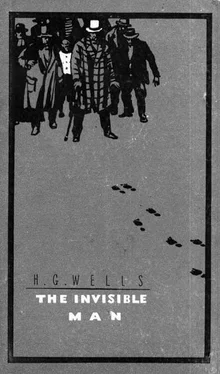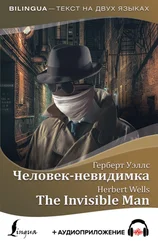"When they found they couldn't prove who's money was which, I'm blessed," he says, "if they didn't try to make me out a blooming treasure trove! Do I look like a Treasure Trove? [2] Epilogue.2 treasure trove — клад, принадлежащий неизвестному лицу и обнаруженный в земле. По английским законам клады, откопанные из-под земли, принадлежат государству, и сокрытие их карается законом.
And then a gentleman gave me a guinea a night to tell the story at the Empire Music 'All—just tell 'em in my own words—barring one."
And if you want to cut off the flow of his reminiscences abruptly, you can always do so by asking if there weren't three manuscript books in the story. He admits there were, and proceeds to explain with asseverations that everybody thinks he has 'em. But, bless you! he hasn't. "The Invisible Man it was took 'em off to hide 'em when I cut and ran for Port Stowe. It's that Mr. Kemp put people on with the idea [3] Epilogue.3 put people on with the idea — внушил людям мысль
of my having 'em."
He subsides into a pensive state, watches you furtively, bustles nervously with glasses, and presently leaves the bar.
He is a bachelor man—his tastes were ever bachelor, and there are no women-folk in the house. Outwardly he buttons—it is expected of him—but in his more vital privacies, in the matter of braces, for example, he still turns to string. He conducts his house without enterprise, but with eminent decorum. His movements are slow, and he is a great thinker. But he has a reputation for wisdom and for a respectable parsimony in the village, and his knowledge of the roads of the South of England would beat Cobbett. [4] Epilogue.4 Cobbett, William (1762–1835) — английский политический деятель и публицист, мелкобуржуазный радикал
On Sunday mornings, every Sunday morning, all the year round, while he is closed to the outer world, and every night after ten, he goes into his bar parlour, bearing a glass of gin faintly tinged with water, and having placed this down, he locks the door and examines the blinds, and even looks under the table. And then, being satisfied of his solitude, he unlocks the cupboard, and a box in the cupboard, and a drawer in that box, and produces three volumes bound in brown leather, and places them solemnly in the middle of the table. The covers are weather-worn and tinged with an algal green—for once they sojourned in a ditch, and some of the pages have been washed blank by dirty water. The landlord sits down in an armchair, fills a long clay pipe slowly—gloating over the books the while. Then he pulls one towards him and begins to study it, turning over the leaves backwards and forwards.
His brows are knit and his lips move painfully. "Hex, little two up in the air, cross and a fiddle-de-dee. Lord! what a one he was for intellect!"
Presently he relaxes and leans back, and blinks through his smoke across the room at things invisible to other eyes. "Full of secrets," he says. "Wonderful secrets!
"Once I get the haul of them— Lord!
"I wouldn't do what he did; I'd just—well!" He pulls at his pipe.
So he lapses into a dream, the undying, wonderful dream of his life. And though Kemp has fished unceasingly, no human being save the landlord knows those books are there, with the subtle secret of invisibility and a dozen other strange secrets written therein. And none other will know of them until he dies.
Задача данного комментария — объяснить наиболее трудные для понимания языковые явления, а также реалии исторического и бытового характера, встречающиеся в тексте.
Язык книги, насыщенный идиоматическими оборотами, является образцом современного разговорного английского языка. Но там, где автор воспроизводит речь жителей Суссекса (графство в юго-восточной Англии), встречается много оборотов, свойственных английским диалектам и просторечию. Основными из этих отклонений от норм литературного английского языка являются следующие:
Двойное отрицание: he don't want no help.
Употребление формы Past вместо Past Participle в перфектных временах и в пассиве: he's took your room; my sister being took up with her little ones. Это явление юмористически подчёркивается автором в сцене с матросом, читающим газету. Он «поправляет» её по-своему: "…it is supposed that he has taken—took, I suppose they mean—the road to Port Stowe."
Употребление форм Present вместо Past: he give a name.
Употребление форм 1-го лица глаголов вместо 3-го и наоборот: he don't; you likes.
Употребление форм единственного числа глаголов to be и to have вместо форм множественного числа: we was.
Употребление ain't (несуществующего вообще в литературном языке) вместо любой формы настоящего времени глаголов to be и to have: he ain't even given a name.
Неправильное образование глагольных форм: seed (прошедшее время от see, вместо saw).
Употребление старой формы Participle I: a-coming и инфинитива без to: I want know (характерно для диалектов).
Употребление архаических форм личных местоимений: 'ee (thee) (характерно для диалектов) и особой диалектной формы личных местоимений him и her — en (слабая форма 'n) с производным от него enself.
Употребление форм личного местоимения they, them вместо указательных местоимений these, those: they goggles; what a turn them bandages did give me.
Употребление указательного местоимения that вместо наречия so перед прилагательными: that bad, that trustful.
Употребление объектного падежа личных местоимений вместо именительного: and him a new guest.
Употребление прилагательного вместо соответствующего наречия: extraordinary strong; he can go through a cordon of policemen as easy as me or you could give the slip to a blind man.
Употребление формы неопределённого артикля а перед гласными: a extraordinary.
В книге нашли также отражение характерные особенности произношения жителей Суссекса:
1) Очень широкое употребление звука [α:] вместо [æ]: larder (ladder); marn (man); вместо [ɔ: и [ɔ]: Gard (God), gart (got), darg (dog), harse (horse); вместо [αι], [αu]: Arm darmed (I'm darned), nar (now);
Читать дальше
Конец ознакомительного отрывка
Купить книгу












